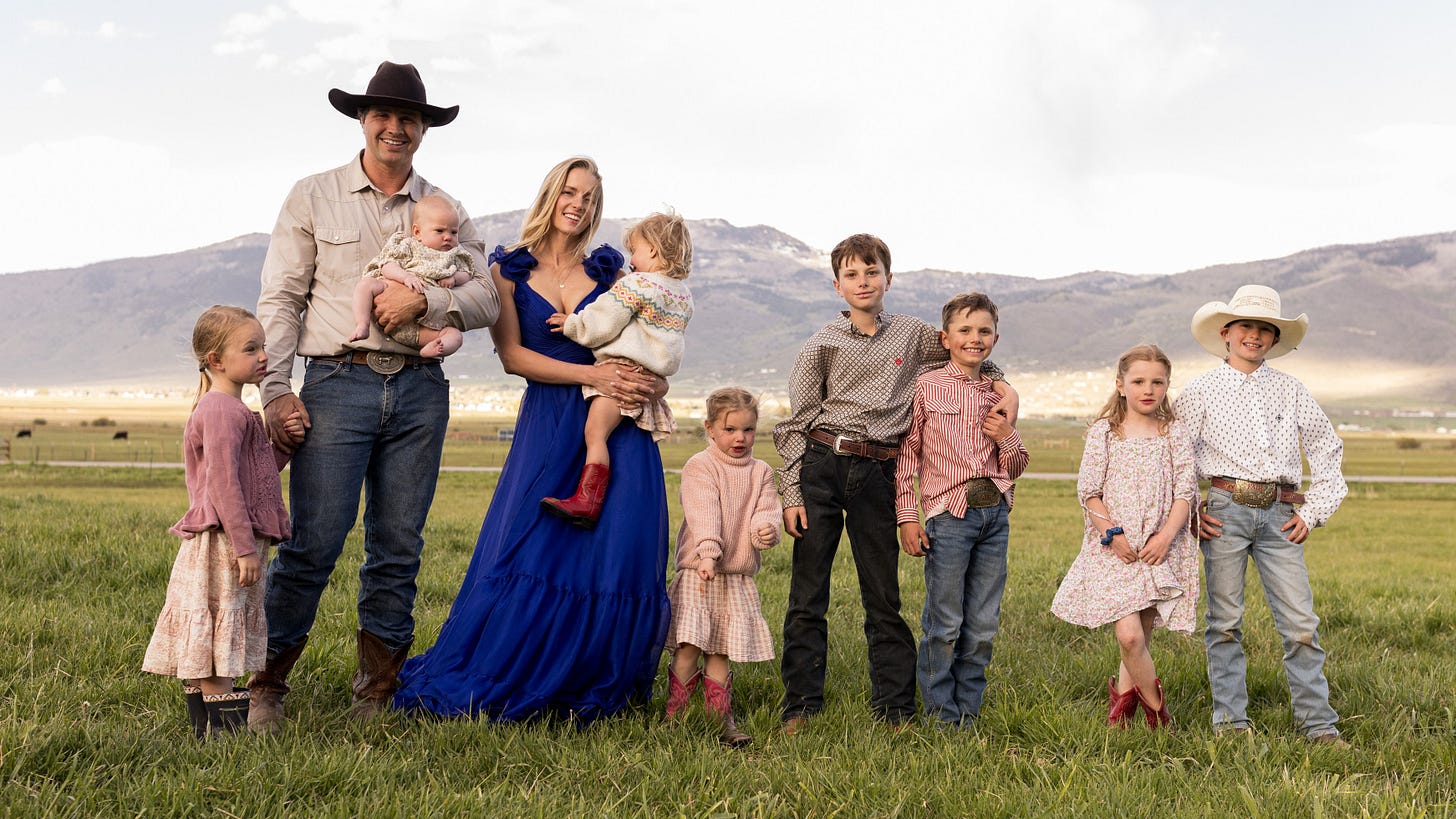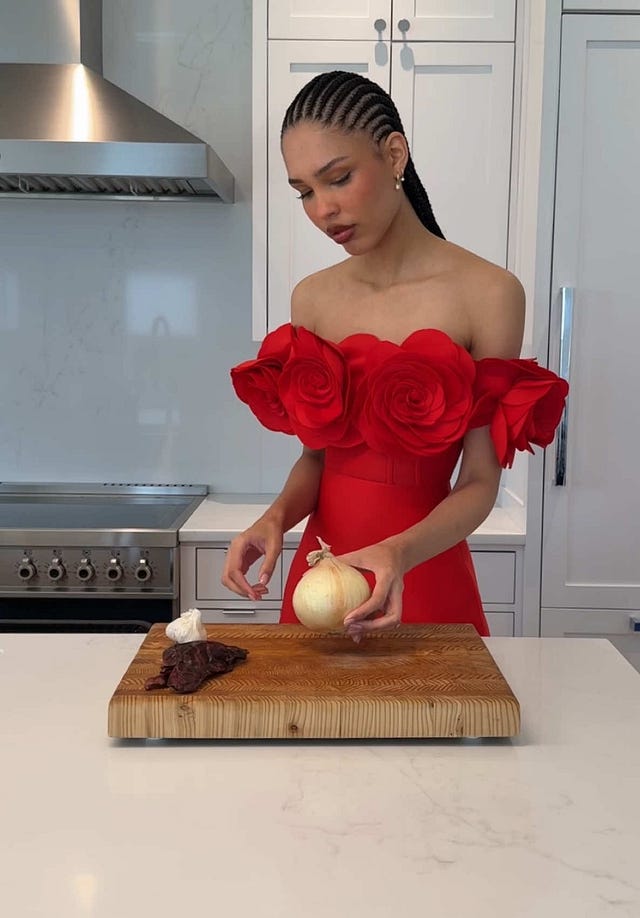you don't want to be a tradwife, you just want to escape capitalism
these influencers are selling us an illusion
It’s no surprise we have seen a rise in the tradwife movement during the past few years.
‘Traditional wives’ are exactly what the word itself implies: married women who embrace traditional gender roles, particularly focusing on homemaking and supporting their husband.
Tradwife influencers are the new talk of the town. We have women like Ballerina Farm—with her farm, her husband, and her eight children—and Nara Smith, married to model Lucky Blue Smith, who, for some reason, loves to cook while dressing like she’s going to the fucking Oscars:
 Tiktok failed to load.
Tiktok failed to load.Enable 3rd party cookies or use another browser
These influencers love to sell you an idyllic lifestyle as stay-at-home mothers who cook most of their meals from scratch, don’t have an office job, seem to have lots of free time and have the privilege to experience the so-called ‘slow life’.
When you search for ‘tradwife’ on Pinterest, the page is filled with aesthetics and ‘starter packs’ with soft and pastel fabrics mixed with dainty femininity and remnants of the ‘cottagecore’ aesthetic that rose during the pandemic, promising us a slow lifestyle filled with wellness and nature.
This Pinterest-perfect version of womanhood is nothing new. We’ve seen it before in different variations, and we will probably will keep seeing more until the day we die.
The tradwife aesthetic is just the latest iteration of this endless cycle of idealized femininity, now wrapped in soft linen dresses and homemade sourdough.
Aesthetics are just aesthetics, but they are always selling something: endless products, and a lifestyle you might want to emulate. And, I am not going to lie—this tradwife movement almost tricked me too.
And, considering that I am a queer woman and a chronic overachiever, that is absolutely nuts.
But it makes sense if you take into account the over-romanticization these creators try to sell you. They never talk about how hard it is to work on a farm. They never show moments like when your baby throws up on you, when your children get lice at school, or the lack of structure—the feeling of being trapped because you economically depend on your husband.
They don’t talk about the fact that being a stay-at-home mother and doing all the house chores while cooking for the entire family might take the same amount of daily hours as an office job. They don’t talk about how hard that can be.
The cracks behind these utopias are starting to show, though. Last year, people started talking about Ballerina Farm’s real story, and how she had to give up her dream of being a professional ballerina while attending Juilliard to marry her current husband.

And after knowing all of this myself, I can still understand why the tradwife movement has gained so much traction lately. Alarming rises in traditional and right-wing politics aside, I feel like this aesthetic is selling you a promise:
If you marry rich, you will be able to get out of the never-stopping hamster wheel we are all trapped in.
It kind of reminds me of this online trend that went around some years ago and is still pretty much alive on apps like TikTok, where creators try to convince young, impressionable women to get a sugar daddy. ‘It doesn’t have to be sexual,’ they promise. ‘Some of them will pay you only for your company.’
Sounds easy, huh? They share websites where you can find lonely, rich men who ‘are not looking for anything sexual’ and ‘will pay for every second of your time’. They don’t mention how dangerous it is to trust strangers on the Internet, or how that ‘non-sexual’ commitment promise can quickly escalate into a difficult situation.
I have had eleven-year-old students telling me things like: ‘Well, I don’t want to work. I just want a sugar daddy’.
Eleven. Years. Old.
Unsupervised online time is the worst thing for children, and parents still don’t seem to understand how dangerous it can be.
However, I find it hard to believe that all of these women—and girls, sadly—dream of being financially dependent on a man.
I don’t want to frown upon those who do—at the end of the day, there's a lot of factors that should be taken into account—but the way it’s being marketed on the Internet truly worries me.
I feel like when some of these women say they aspire to becoming a tradwife, they mean they aspire to live the life that is being marketed to them.
A slow life where they have enough time to cook meals from scratch. The false notion that their time is theirs, and only theirs—even though nothing could be further from the truth.
The notion that their time will be invested in their own lives, houses, and families instead of being stolen by a big corporation.
The tradwife movement, after all, is a direct response to the girlboss feminism of the 2010s, whose motto was basically: ‘Exploit or be exploited, but be proud to be a woman under capitalism.’
It’s also a reaction to the rise of wellness culture and the rejection of the hectic city lifestyle since the pandemic.
But while the girlboss movement told women they had to work tirelessly to prove their worth, the tradwife movement tells them their worth is inherent… As long as they fit within a traditional, submissive role.
Both movements are two sides of the same coin: a response to late-stage capitalism, packaged as empowerment. One tells you to devote yourself to your boss, the other tells you to devote yourself to your husband.
However, while these tradwife influencers paint a picture of simplicity and domestic bliss, what they don’t talk about is the privilege that makes their lifestyle possible.
They have money for expensive organic groceries, time to make elaborate meals, and homes that look straight out of a Nancy Meyers movie. For the average woman, this version of slow living is out of reach—not because she doesn’t want it, but because she simply can’t afford it.
And listen, being a mother must be something incredibly beautiful. I even want to be a mother myself one day—but we have to remember that it’s so much more than just an aesthetic.
It’s a real-life experience with its downsides, just like having your own farm or dedicating your entire day to housework. It’s not always about sunny, smiling pictures in the countryside, big family dinners, and home-baked cakes.
Sometimes, it’s arguing in whispers because you don’t want the kids to wake up. Sometimes, it’s ruined holidays, burnout, messy kitchens, grocery coupons, endless tantrums, and much, much more.
If you want to become a tradwife, you need to want it for the right reasons and keep in mind not only the ugly sides but also the social and political forces that might be shaping this mindset. Because, at its core, the tradwife movement romanticizes a past that wasn’t so idyllic for many women.
Sure, the idea of baking bread and growing your own garden sounds lovely, but it also comes with an expectation of complete devotion to a husband and home, often at the expense of personal ambition and independence.
It’s not just an aesthetic, it’s a romantization of rigid gender roles that many women before us fought to escape.
And, even if choosing to become a tradwife is not inherently bad, it's also important to consider everything these—still rich, still marketable—tradwife influencers might experience when they turn their cameras off.
When I look at these pictures, I still feel a sense of longing…, and I know for sure that it's not because I want to become a tradwife.
It's because I want to escape capitalism.
I want a little house in the countryside where I can breathe fresh, unpolluted air. I want slow mornings and fresh vegetables, real food from farmers’ markets. I want my time to be only mine. I want to engage in my hobbies without the pressure to be productive. I want to spend more time in nature and get real vitamin D instead of being stuck indoors for more than eight hours a day.
And no amount of Pinterest pins will take me there. In the end, the tradwife trend is just that: a trend.
A curated, vintage-filtered fantasy that, for most people, exists only on a screen.
Nothing more than a simple illusion.
thank you for reading! the weekly scrapbook is a reader-supported publication, so if you’d like to support my work, you can become a paid subscriber or buy me a coffee ☕ (or... matcha?) .









Such an on-point read, thank you for this.
I’ve been thinking often about how many feminine presenting people might also experience a desire to reclaim the feminine parts of them that have traditionally been looked down on by patriarchy.. domestic skills and feminine “hobbies” for example, are so often looked down on as “real work” or requiring “real talent.” Especially as a reaction to being girlbossified - we want to be gentle and feel our feelings and knit or whatever in peace without it being invalid or not “productive” - in this way it feels like the trad wife movement is co-opting our desire to reclaim the feminine and selling it back to us - at a huge price.
I would say that this “trend” resonated with a lot of women, because, for example, in my culture, being a woman means taking care of your home and making it a safe place for the whole family. For most of women it’s a dream to have a family and a beautiful home, where she and her family can flourish. So it’s not just a trend, it’s been a way of life for many women for centuries.